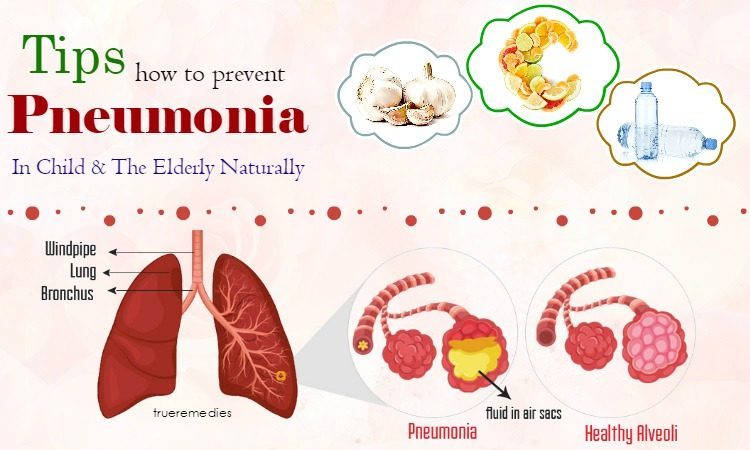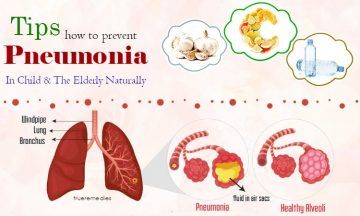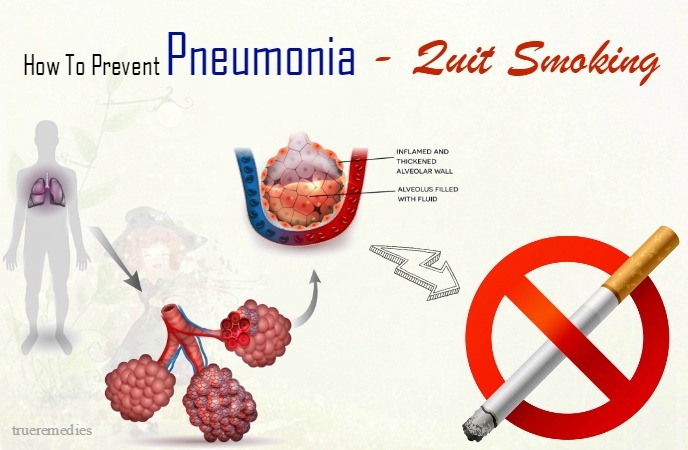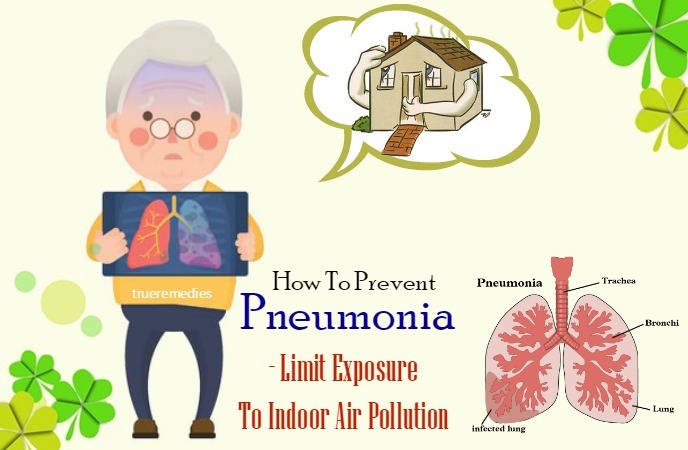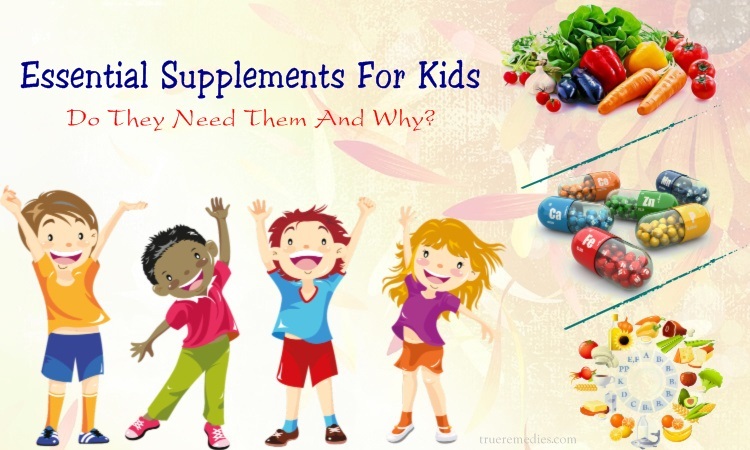Updated: 11/15/2019
Contents
Pneumonia is an infection of the lower respiratory tract. It can occur at any age, especially in young children and the elderly. It usually occurs in winter when the temperature is low. The disease causes a lot of impact on the patient's life. The treatment also takes a lot of your time. Therefore, prevention is what you should do. If you are interested in this, this article is for you. The tips on how to prevent pneumonia in child and the elderly naturally below will help you minimize your risk of getting this respiratory problem at home without cost. However, knowing more about this disease is also as important as learning such tips. Please read the information below.
What Is Pneumonia?
Pneumonia is an acute infection of the lungs (either the lungs or the whole lung). There are many types of microorganisms that cause pneumonia. The most common cause of pneumonia is bacterial infection. After influencing the upper respiratory tract, the virus damages the mucous membrane of the respiratory tract, making it easy for bacteria to enter and attack the lungs. Infected lungs drain and leave dead cells. This obstructs tiny air sacs in the lungs and reduces the oxygen flow. Without enough oxygen, your body can not function properly.
According to statistics, there are more than 50 types of pneumonia from mild to severe. Respiratory experts have studied and concluded that pneumonia is no longer dependent on the time of detection and treatment. If patients are detected early and treated properly, they can be completely cured. In contrast, patients may face some serious complications. The danger level of pneumonia usually depends on the patient's health. Pneumonia can cause complications such as:
- Bacteria In The Blood
In some cases, infection can enter the bloodstream and spread to other organs.
- Lung Abscess
Pneumonia can cause potential complications as a pus-filled cavity in the affected lung area. That is the phenomenon of lung abscess.
TrueRemedies Partner Solutions

Need a Help from the Leading Expert Online, Available 24/7?
They’re all here and ready to answer your questions online or by phone. Keep asking questions until you get the answer you need.
- Pulmonary Effusion And Infection In The Surrounding Area
Typically, the pleura are very smooth to allow the lungs to move easily along the chest wall when breathing. However, when the pleura are inflamed, the fluid may accumulate which results in pulmonary effusion and infection in the surrounding areas.
- ARDS (Acute Respiratory Distress Syndrome)
This is an inflammation in both lung areas, which reduces the amount of oxygen in the blood.
What Are Common Causes Of Pneumonia?
Here are common causes of this disease:
- Pneumonia Caused By Bacteria
When you have a serious cold or flu, the bacteria can form, grow and spread, causing pneumonia. This is the most common cause of this disease. The bacteria that cause pneumonia are increasingly resistant to drugs, making it very dangerous. Studies have shown that pneumonia is one of the most dangerous diseases that a patient experiences when he or she is in hospital. This occurs when a person with impaired resistance (a patient with a cold or an HIV patient, etc.) is exposed to the hospital environment and inhaled air containing the bacteria that causes pneumonia. At present, gram-negative bacteria predominate over gram-positive bacteria, making it easier for the disease to occur.
- Pneumonia Caused By Virus
Common pneumonia viruses include respiratory syncytial virus (Respiratory syncytial virus-RSV), parain fluenza, influenza virus, and adeno viruses. In developed countries, pneumonia caused by viral infections is superior to bacteria. Virus is the most common cause of pneumonia in developed countries. Pneumonia caused by virus may not be severe and usually lasts for a short time. However, influenza virus can cause severe and fatal pneumonia. Pregnant women or patients with heart or lung disease should be careful with this condition.
- Pneumonia Caused By Fungi
In people with impaired immunity or with diseases that impair immune function (such as HIV), the entry of the fungus into the respiratory tract can cause pneumonia. In chronic stage, fungal pneumonia is more likely to be confused with tuberculosis or lung tumors.
- Pneumonia Caused By Mycoplasma
Symptoms of this condition are similar to bacterial or viral pneumonia, but its symptoms are usually mild and the patients may not even know they have pneumonia.
- Pneumonia Caused By Pneumocystis Carinii Pneumonia
Pneumocystis carinii pneumonia is a common opportunistic infection in HIV / AIDS patients. People with impaired immune systems from organ transplants, chemotherapy or corticosteroid treatment are also at risk for this type of infection. Symptoms of Pneumocystis carinii pneumonia include persistent cough, fever and shortness of breath.
- Other Causes Of Pneumonia
These include physical agents, chemicals, or allergens that cause allergic reactions. For these reasons, the patient inhaled these agents from the external environment into the lungs, causing pneumonia.
What Are Common Symptoms Of Pneumonia?
The common symptoms of pneumonia are [1]:
- Persistent cough
- Fever
- Chills
- Shortness of breath
- Chest pain when you breathe deeply or cough
- Headache
- Anorexia
- Weariness and muscle aches
- Nausea and vomiting
You may experience other symptoms not mentioned. If you have any questions about the signs of the disease, please consult your doctor.
Who Is At High Risk Of This Disease?
Anyone can get pneumonia. Adults, children and people with chronic diseases such as COPD and asthma are at high risk for pneumonia.
Being an older adult also increases the risk of pneumonia. Also, having a weak immune system because of other ailments like viruses such as HIV, hepatitis, measles, autoimmune disorders or serious infections is also one of risk factors of pneumonia.
Taking certain medications which lower immunity, smoking cigarettes, having trouble swallowing, drinking unclean water, living in the unhygienic areas are among common risk factors of this condition.
You can control this problem by minimizing risk factors. Please see your doctor for more information [2] [3].
When To See A Doctor?
You should contact your doctor if you have any of the following:
- Chronic fever accompanied by chills
- Chest pain and shortness of breath
- You have let your young child (5 years old) or the elderly (65 years) take pills for pneumonia
- Coughing with blood or sputum from the lungs
- Shortness of breath
If you have any of these signs or symptoms or have any questions, please consult your doctor. Each person's condition is different, so please consult your doctor to select the most suitable option.
As you have learned about basics of pneumonia, now it is time to know how to protect yourself and other family members from the different pathogens causing pneumonia. As we emphasized at the beginning, early prevention is always something you should do. The following part in this article will introduce to you 17out of the most effective tips on how to prevent pneumonia in child and the elderly naturally at home. Take a look at TrueRemedies.com!
Top 17 Effective Tips On How To Prevent Pneumonia In Child & The Elderly Naturally
1. How To Prevent Pneumonia – Quit Smoking
In order to know how to prevent pneumonia naturally, quitting smoking is extremely important. The best way to protect your lungs is to stop smoking and even better if you do not start smoking. Smoking is the main cause of pneumonia, lung cancer and chronic obstructive pulmonary disease (COPD). The risk of lung disease of smokers is 20 times higher than non-smokers. Besides cigarette smoke, other types of smoke are also not good for the lungs. You should avoid the smoke from cigars and marijuana. They can increase your risk of pneumonia.
In addition to pneumonia, we also refer to two other common lung diseases. You should know about them. Lung cancer occurs when cells grow out of control and form tumors in the lungs. These tumors interfere with the function of the lungs such as breathing. If metastasis, cancer can affect other tissues and organs like the chest. Chronic obstructive pulmonary disease (COPD) causes increased mucus secretion, shortness of breath, wheezing, cough and chest tightness. The disease will become worse over time.
2. Avoid Indirect Exposure To Tobacco Smoke
How to prevent pneumonia naturally in advance? In addition to not smoking, you should also avoid indirect exposure to tobacco smoke, such as in bars, casinos and public places that allow smoking. Non-smokers who are exposed to tobacco smoke are 20 times more likely to develop pneumonia than non-smokers and people who do not exposure to tobacco smoke. Although research is still relatively new, many experts believe that we, especially infants and young children, should avoid exposure to tobacco smoke. These are toxic and chemical substances which can cling to clothing, hair, carpet, and walls. Therefore, although you do not smoke, you can still breathe secondhand smoke.
3. How To Prevent Pneumonia – Use Garlic When Cooking
Although eating raw garlic seems to be the best, cooked garlic still contains allicin that is thought to be effective against the flu. Garlic boosts the immune system, preventing the flu, especially in the winter. Peel and crush or chop a few garlic cloves. Leave it for 15 minutes to allow the enzyme activity to activate the allicins in the garlic. Use 2-3 garlic cloves each meal when you have a cold. You can also try to cook garlic together with vegetables or add garlic to rice when cooking. You can also add chopped garlic into tomato sauce or cheese sauce when you feel better. Add garlic into meat and cook as usual [4] [5].
4. Vitamin C Supplementation
Vitamin C supplementation is an effective way on how to prevent pneumonia in child and the elderly naturally. This antioxidant vitamin is very important in supporting the body's immune system. Scientists have shown that taking a large amount of vitamin C can reduce the symptoms of colds and flu. As a result, these conditions also will not get worse and pneumonia will also be reversed.
Give your body 1000mg of vitamin C every hour for the first 6 hours as soon as the symptoms of flu begin to appear. Then take 1000mg 3 times a day. Do not continue to take high doses of vitamin C if you are feeling better. The toxicity of vitamin C is very little, but you still need to be careful. Orange juice is a natural source of vitamin C. Talk to a doctor before giving your child high doses of vitamin C.
5. How To Prevent Pneumonia – Take Frequent Deep Breaths
Deep inhalation helps to supply O2 to the entire body. Deep inhalation uses the entire volume of the lungs to oxidize the blood. Although normal breathing is not bad for health, deep breathing helps to bring the amount of oxygen throughout the body to the highest level. Pay special attention to the diaphragm when inhaling and exhaling deeply. Feel the diaphragm lowered by deep breathing until you feel your abdominal muscles tightening and your diaphragm rising.
Besides, you should also breathe through the nose. The nose works as a filter and allows only very small particles to penetrate. Nose can filter small particles with pollen grains with efficiency up to 100%. Therefore, breathing through the nose is much better than oral breathing.
6. Laugh More
This sounds strange when it comes to tips on how to prevent pneumonia naturally, but laughing can help you a lot in this case. Similar to deep breathing, big laughs help push air out of your lungs, allowing you to breathe in fresh air and provide more oxygen. Laughter also enhances abdominal health and increases lung capacity. This helps you to improve your lung health and prevent pneumonia.
7. How To Prevent Pneumonia – Cardio Exercises
Aerobic exercise alone will not help your lungs healthier. Even so, cardio-breathing exercises will help the lungs easily supply oxygen to the heart and muscles. Cardio also puts less pressure on the lungs so that the lungs can perform its function without too much activity. The American Heart Association recommends a minimum of 30 minutes of intense cardio workout of 5 days a week or more to maintain cardiovascular and lung health.
8. Change Your Diet
No wonder, to know how to prevent pneumonia naturally, you need to know the right diet to plan. Studies show that diets rich in fruits, vegetables and fish are beneficial for the health of the lungs. This is especially true for people with pneumonia, asthma, COPD and other lung diseases. A 2010 study proved that diets which are high in cabbage, broccoli, and kale can reduce the risk of pneumonia.
9. How To Prevent Pneumonia – Keep The Nose Well Ventilated
Allergies and many other illnesses can cause a blocked nose. Nasal congestion means you are 100% directly exposed to germs and pulmonary contamination due to breathing through the mouth. Oral breathing can cause diseases such as pneumonia, asthma or other complications of the lungs to become worse, or even cause lung complications. You can treat common allergies with antihistamines or other congestive remedies to keep your nose clean. On the other hand, a nose that is too dry due to illness can also reduce the ability of the nose to filter the air. Therefore, consider using humectants or a nasal spray to provide moisture to the nose, which will help to filter the air you breathe better.
10. Drink A Lot Of Water
This is another must-try treatment in this list of tips on how to prevent pneumonianaturally. In addition to other positive effects, drinking plenty of water is good for the lungs. Water supply helps to keep the lining of the lungs thin, so that the lungs can perform more efficiently. As a result, pneumonia is also repelled.
As you know, flu virus is one of the causes of pneumonia. Flu can cause fever that makes your body dehydrated, so it is important to drink plenty of fluids. Drink hot water like tea or lemon juice. It not only provides water to the body but also helps the throat soften and clean the sinuses. Limit drinks with caffeine, alcohol and soda. Choose water that helps restore the body's nutrients and minerals, not exhausting them. You can also drink hot soup. You may feel nausea and anorexia when you get the flu. Drinking soup or hot soup is the best way to put food into your body without disturbing your stomach.
Studies have shown that chicken soup can reduce the inflammation occurring in the respiratory tract, so if you feel well enough, you should eat one to two bowls of chicken soup, which will be good for the body. If you get nausea, you may lose electrolyte balance. Use some rehydration products, such as Oresol (available at the pharmacy) or sports drinks that can provide electrolytes to restore your body. You need to pay particular attention to the treatment of the flu in order to prevent pneumonia.
11. How To Prevent Pneumonia – Avoid Exposure To Outdoor Air Pollution
Avoiding exposure to outdoor air pollution is a must-know tip on how to prevent pneumonia in child and the elderly naturally.
Although it is almost impossible to avoid exposure to CO2 and common air pollutants, you can limit their exposure. You can search for air quality information in the city where you live before planning outdoor activities. Ozone (O3) is a gaseous pollutant, and summer weather can cause O3 and other pollutants to build up in the air. Because of this phenomenon, you need to be careful about the quality of the air from the end of spring to the hot summer months.
Avoid areas prone to traffic jams. For people living in large cities, people often walk or bike on jams easily as a form of exercise. Exhaust emissions from vehicles and other pollutants can be harmful to the lungs, especially when you have to breathe through the mouth during intense exercise. This causes the natural filtration of the nostrils cannot take place. Find out the forecast of air pollution to determine the air quality in your area.
12. Limit Exposure To Indoor Air Pollution
Air pollution is not just a problem in the outdoor air. Fireplaces, wood stoves, pet hair and molds are common causes of indoor air pollution. To remove these agents, clean your home regularly and replace the air purifier. This significantly reduces air pollution in the home. Consider buying a household air purifier to help filter contaminants such as cigarette smoke, mold and pet hair.
Chemicals from household cleaning fluids, paints and other household appliances can irritate the lungs or contribute to diseases such as pneumonia and asthma. Therefore, you should read carefully and follow the instructions when using these products in a well-ventilated area. You can find out more information on how to improve indoor air. You may not know that radon is a natural gas that occurs in many homes and affects air quality. Radon can increase the risk of lung diseases, especially pneumonia and lung cancer. You should buy Radon gas detectors at home appliances stores to check your indoor radon concentration.
Placing air purifiers in the home can help remove dust, smoke and other pollutants. Air conditioners, electric seeders and ionisers are some of the filters available in the home. Be cautious with O3 branding products to clean the air. O3 is the top pollutant, especially in the summer. So avoid buying products that can produce toxic O3 while purifying the seeds in the air.
To improve the quality of indoor air, you can also grow many ornamental plants. Plants are one of the best ways to improve indoor air quality. In addition to transferring CO2 into O2, research has also shown that ornamental plants can help reduce concentrations of O3 (a toxic pollutant) in the home.
13. Avoid Exposure To Chemicals And Contaminants At Work
Avoidance of chemicals and contaminants at work is regarded as a basic way on how to prevent pneumonia naturally. People working in mines, laboratories or industrial zones often have to deal with large quantities of carcinogenic chemicals and pollutants. Therefore, you should use poisonous respirators, toxic air extraction cabinets and other safety equipment in the workplace. Amiang, arsenic, nickel and chromium are chemicals that can cause pneumonia and many other complications in the lungs. Exposure to these substances can also lead to lung cancer and COPD.
14. How To Prevent Pneumonia – Avoid Inhaling Other Stimulant
Similar to the aforementioned preventative tips on how to prevent pneumonia naturally, you need to avoid inhaling stimulants to protect your lungs from lung-disease triggers. There are many substances that the lungs are not designed to breathe. Therefore, cover your mouth, nose when working with or in a space containing small particles that you may accidentally inhale. Also, do not refrain from coughing because this is the way the body excretes substances from the outside to enter. Avoid inhaling:
- Talc powder or baby powder: they contain crushed stones that can be trapped in the lungs. Instead, use baby powder from cornmeal.
- Fiberglass: Fiberglass can cause small cuts in the lungs if inhaled.
15. Avoid Nose-To-Nose Contact
Moisture and saliva droplets from our respiratory tract could trigger the spread of pneumonia-causing organisms from calf to calf. If you usually have nose-to-nose contact, you will be prone to catch pneumonia.
Also, avoid sharing eating utensils, straws or cups with others. The same goes for handkerchiefs and facial tissue.
16. How To Prevent Pneumonia – Get Vaccinated
The Hib and Pneumococcal vaccines (PVC13) vaccine will assist you in protecting your children against bacterial pneumonias. Adults can also get vaccinated, but there are some certain people who should not get this vaccine. They include:
- Pregnant women
- People who are allergic to any ingredient in the vaccine
- People who had allergic reactions to PCV7 – the former version of the pneumonia vaccine
- People experiencing a severe flu, cold or any other ailment.
Keep in mind that pneumonia vaccines might have some secondary effects, such as muscle aches, swelling or redness at the site of infection, chills, and fever. For children, they should not get the flu vaccine and the pneumonia vaccine at a time as this might trigger fever-related seizures.
17. Take A Follow-Up Visit If Necessary
Taking a follow-up visit is the last but not least important tip on how to prevent pneumonia naturally at home. This will help you minimize the risk of getting pneumonia beforehand. Some doctors (not all) will schedule a follow-up appointment for you. A follow-up visit usually takes place one week after your first visit to ensure that your condition is progressing well. Even though you no longer notice the signs of pneumonia and you feel more comfortable, the virus or bacteria that cause the disease may still exist in your body. Therefore, the disease may recur and it is best to go for a follow-up visit.
The above are tips to help you prevent pneumonia naturally at home. They are all very practical and useful. Let’s apply them to protect yourself. If you have any contributing ideas about our article of “Top 17 Tips On How To Prevent Pneumonia In Child And Elderly Naturally” introduced in How To Category, do not hesitate to drop your words below this post. We will answer as soon as we could.

